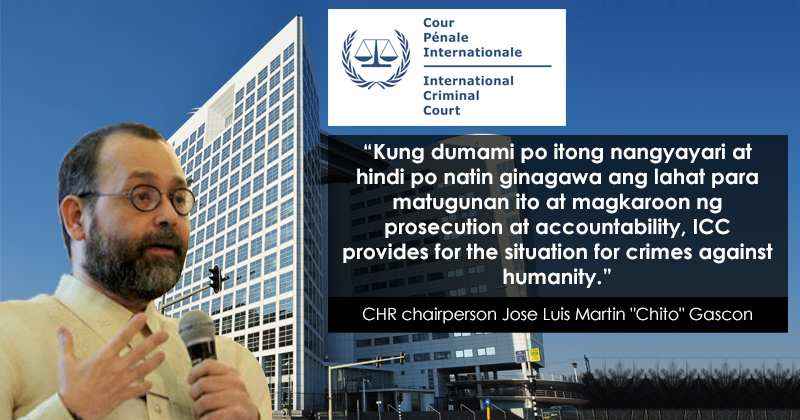24 Aug International Criminal Court May Investigate Drug-Related Killings in the Philippines
On Tuesday, August 23, the Commission on Human Rights (CHR) has been asked by Senator Leila De Lima, chairperson of the committee on justice and human rights, if the International Criminal Court (ICC) has the right stance to file charges in the current drug-related killings in the Philippines, and what are their basis in doing so.
CHR chairperson Jose Luis Martin “Chito” Gascon answered, “Failure of government to address this situation currently prevailing, the unexplained extrajudicial killings, and to provide remedies in terms of prosecution of perpetrators could result in the possibility of the International Criminal Court exercising jurisdiction over those matters if we fail to do so.”
This conversation came during the second Senate hearing on the extrajudicial killings attributed to the current campaign against drugs and after the news broke out that our dearest President Rodrigo Duterte may face charges of crimes against humanity by the International Criminal Court (ICC) if the unexplained killings continue.
Gascon explained further, “In fact, the United Nations has a mechanism of monitoring and the international criminal court as well. They receive information on a regular basis. They can conduct consultation; provide advisory support for us to address the concern. And if these concerns are not adequately addressed, then their prosecution will make a recommendation of assumption of jurisdiction.”
“Sabi niya sa kanyang report, ang extrajudicial killing ay any killing by government as well as others that the government failed to investigate,” he added.
For the record, Genocide, war crimes, aggression, and crimes against humanity are the only types of crimes that the ICC can investigate. Gascon said, “Kung dumami po itong nangyayari at hindi po natin ginagawa ang lahat para matugunan ito at magkaroon ng prosecution at accountability, ICC provides for the situation for crimes against humanity.”
To prove that there is indeed a crime against humanity, there must be widespread and systematical crimes in a certain country and that is where the ICC can meddle in our country’s current problem.
“Widespread is not based on numbers. It is based on the condition that it was not given enough remedy. There are no fixed numbers.) There have been instances by other courts that a single act qualified as crimes against humanity if it is undertaken in a systematic attack,” he said.
De Lima finally counters Gascon, saying, “Systematic, meanwhile, refers to a crime that is sanctioned by the state – something difficult to prove. State-inspired is difficult to prove. But it’s the totality of the circumstance, totality of the cases because you know heads of state will not admit that policy.”
Despite the current rift between President Duterte and Senator De Lima, in this case, they are allies, preventing the ICC to interfere the country’s current campaign against drugs and criminality.
If we consider the reality of these events, the killings may come from rival syndicates of the victims and just used the hype of the moment to credit the killings to the President as a cover-up instead of themselves who are really the real suspects.



No Comments